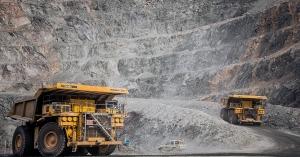


(Posted on 05/06/23)
Rio Tinto has successfully completed the full transition of its heavy machinery from fossil diesel to renewable diesel at its Boron, California operation, making it the first open pit mine in the world to achieve this milestone. The change to renewable diesel brings an anticipated CO2 equivalent reduction of up to 45,000 tonnes per year, comparable to eliminating the annual emissions of approximately 9,600 cars.
Rio Tinto Minerals Chief Executive Sinead Kaufman said: “We are proud that our U.S. Borax operations have become the first open pit mine to operate a fleet running entirely on renewable diesel. This is an excellent example of what happens when internal and external partners collaborate toward a carbon reduction goal. Support from the state of California has also been incredibly important, as without their vision, this would not have been possible.”
“The transition at Boron is an important first step and will undoubtedly lead to further opportunities to decarbonise our global operations. Renewable diesel is one of several sustainability solutions that Rio Tinto is using to transform its businesses.”
An initial trial of switching fossil diesel to renewable diesel in a U.S. Borax haul truck was conducted through 2022 in partnership with Neste and Rolls-Royce. Rio Tinto U.S. Borax used Neste MY Renewable Diesel™ during the trial. Made from sustainably sourced, 100% renewable raw materials such as used cooking oil and animal fat waste, the use of Neste MY Renewable DieselTM can reduce greenhouse gas emissions by up to 75% over the life cycle of the fuel compared to fossil diesel*. Results from the trial showed that a truck running on renewable diesel delivered similar performance and reliability as trucks running on conventional diesel.
Based on these positive results, Rio Tinto U.S. Borax continued to work with Rolls-Royce, Neste, the Environmental Protection Agency, and the State of California to fully transition its heavy machinery fleet onsite to renewable diesel at the end of May 2023. This transition includes all the heavy machinery on the property from haul trucks to loaders, and the renewable diesel is even used in blasting.
This conversion to renewable diesel supports Rio Tinto’s global decarbonization objectives, which include a 50 per cent reduction in Scope 1 & 2 emissions by 2030, and a commitment to reach net zero by 2050. The company estimates carbon emissions from the use of diesel in its mobile fleet and rail accounted for 13% of its Scope 1 & 2 emissions in 2022.
The National Grain and Feed Association (NGFA) has applauded Senator Deb. Fischer’s (R-Neb.) reintroduction... Read more
Anglo American plc and Teck Resources Limited have received regulatory approval from the Government... Read more
The Rhodes Ridge Joint Venture has approved a $191 million (A$294 million) (Rio Tinto share $96 million... Read more
Trafigura Group Pte Ltd, a global leader in the commodities industry, has announced its financial results... Read more
Rio Tinto has successfully produced the first copper from the Johnson Camp mine in Arizona using its... Read more
The American Soybean Association’s World Initiative for Soy in Human Health programme and the... Read more
Karlka Nyiyaparli Aboriginal Corporation (KNAC) Registered Native Title Body Corporate and Rio Tinto... Read more
OCI Global, a leading global producer and distributor of nitrogen products has announced that it has... Read more
In December 2024, SSAB was granted a permit by the Land and Environment Court at Umeå District... Read more
The President of the Republic of Guinea has joined project partners WCS1, Baowu, Chinalco and Rio Tinto... Read more